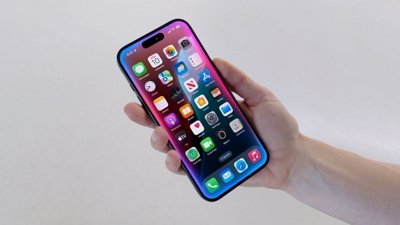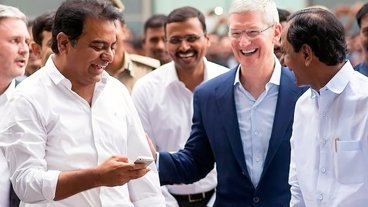Digging into customer dissatisfaction with the AT&T network, The New York Times revealed that the carrier has struggled to keep up with demand as iPhone owners use more and more bandwidth. The report suggests that AT&T's reputation could be tarnished because, for some users, its network is unable to keep up with demand. The bandwidth issues have led to delays of tethering and multimedia messaging, much-anticipated features for iPhone users.
"The result is dropped calls, spotty service, delayed text and voice messages and glacial download speeds as AT&€™s cellular network strains to meet the demand," the report, which compared the device to a gas-guzzling Hummer, states. "Another result is outraged customers."
The average iPhone user reportedly consumes 10 times the bandwidth of a typical smartphone user, but that is expected to change in the near future. The growth of the iPhone and its impact on the AT&T network has even led to lawsuits. As other mobile devices emulate the iPhone and also use more network capacity, the problem is expected to grow on all networks, not just AT&T.
Even John Donovan, chief technology officer for AT&T, admitted his company's struggles. "It's been a challenging year for us," he told the Times.
But in the face of demand, AT&T plans to spend $18 billion this year to upgrade and expand its 3G network. And the company has no plans to cap data use, whether solely through the phone or via tethering with a computer.
AT&T announced Wednesday that it had improved its 3G coverage in metro New York and New Jersey. The company expects to roll out nationwide improvements with HSPA 7.2 technology, with the upgrade to be completed in 2011. And 1,900 new cell towers are planned for construction in the U.S. this year as well. But expansion isn't so simple.
"As fast as AT&T wants to go, many cities require lengthy filing processes to erect new cell towers," the report states. "Even after towers are installed, it can take several months for software upgrades to begin operating at faster speeds."
Many analysts believe that when Apple's exclusive contract with AT&T expires in 2010, the handset maker will offer the iPhone on other carriers. The most obvious jump would be to Verizon, the largest carrier in the U.S., ahead of No. 2 AT&T.
 Slash Lane
Slash Lane






-m.jpg)






 Malcolm Owen
Malcolm Owen

 Amber Neely
Amber Neely

 Wesley Hilliard
Wesley Hilliard


 William Gallagher
William Gallagher









145 Comments
i've had my 3GS since launch and I think one month i was at 1GB plus or minus a few hundred MB
just because of this article i think i'll turn my wifi off and try to hit 5GB next month
It's the network- no, it's the phone- no, it's the user.
They are charging me $40 a month for "DATA", the same as I pay for my comcast cable modem. The cable modem runs circles around the marginal 3G service I get from AT&T. 18 million times $40 is....well, a lot. It's not like it was a surprise that iPhones can use the data network. AT&T was just banking on the fact that nobody would want to (based on old shitty smartphone designs). That's their own mistake.
"Fix your network with the HUGE F'ing pile of cash you have from the iPhone subscriber base!", is the only advise I have.
Sheldon
Obviously every carrier is going to need to step up, this is what every customer is going to be demanding from the new breed of smartphones. It is a testament to how much better the iPhone is than the competition that people aren't running from it based on my personal experiences with dropped calls, voice messages showing up without the phone ever ringing, text messages arriving days later, and random dead spaces. All the more reason to end exclusive agreements, let the carriers with the capability compete for the high-bandwidth customers.
I'm glad I live in Alabama. I have 3G and surf my iPhone like a computer. I have no problems and most of the time I don't turn on wifi the 3G is so fast. There aren't that many iPhones here so not much congestion. I was in Manhattan a few months ago and my iPhone was painfully slow so feel sorry for the people having to put up with that.